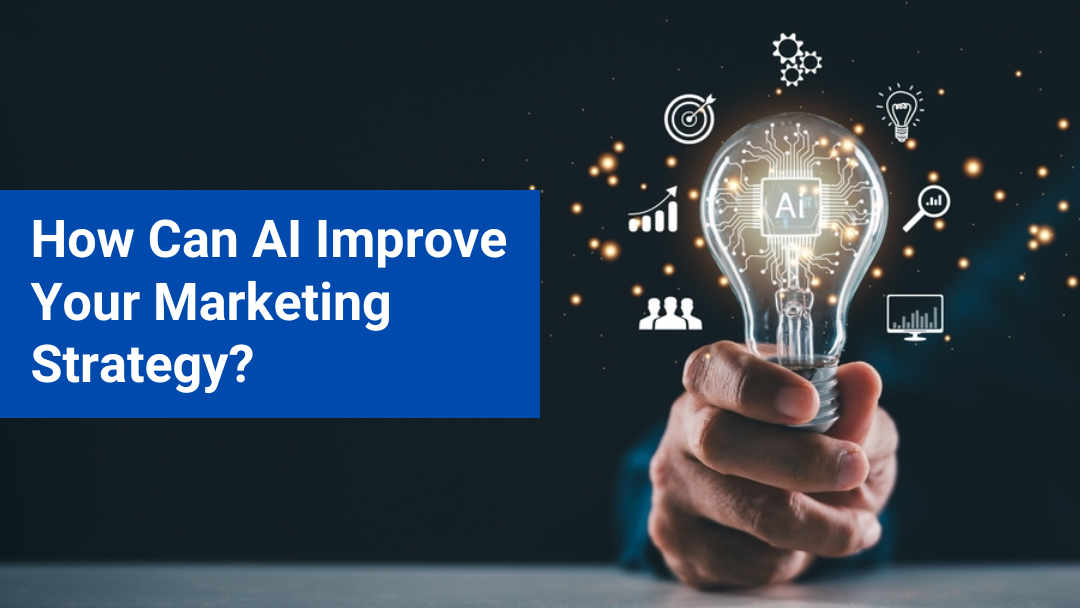How Can AI Improve Your Marketing Strategy?
Do you want to grow your business online? If yes, AI marketing strategy is what you should be learning and investing in. To understand and get a clear picture of how can AI improve your marketing strategy, read this article till the last.
What is an AI marketing strategy?
An AI marketing strategy integrates artificial intelligence technologies to enhance marketing efforts through automation, data analysis, and personalization. It uses AI tools to analyze customer data, predict behaviors, and optimize campaigns in real-time. This strategy automates routine tasks like email marketing, ad buying, and social media management while personalizing customer experiences with targeted content and recommendations.
AI also helps businesses forecast trends, allocate budgets efficiently, and reduce customer churn. An AI marketing strategy enables more efficient, data-driven decision-making to improve engagement, customer satisfaction, and return on investment (ROI).
How can AI improve your marketing strategy?
AI can significantly enhance your marketing strategy by providing data-driven insights, automating processes, and enabling personalized customer experiences. Here’s how AI can improve various aspects of marketing:
1) Personalization at Scale:
- Customer Segmentation: AI helps segment audiences based on behavior, preferences, and demographics, allowing for targeted marketing campaigns.
- Personalized Content & Recommendations: AI analyzes customer data to recommend products, content, and services tailored to individual preferences, increasing engagement and conversion rates.
2) Predictive Analytics:
- Customer Behavior Prediction: AI can analyze historical data to predict future customer behaviors, helping marketers optimize campaigns, product recommendations, and pricing strategies.
- Sales Forecasting: AI helps predict sales trends, enabling better planning and decision-making around product launches, inventory management, and marketing spending.
3) Automating Routine Tasks:
- Email Marketing: AI-powered tools can optimize email campaigns by analyzing open rates, crafting personalized subject lines, and sending emails at the best times.
- Social Media Management: AI tools can schedule posts, monitor trends, and even respond to customer queries through chatbots, freeing up time for marketers to focus on strategy.
4) Optimized Advertising:
- Ad Targeting and Retargeting: AI helps optimize ad placements by analyzing audience behavior and improving targeting precision. It can also retarget users who have interacted with your brand but not converted.
- Dynamic Pricing: AI enables real-time pricing adjustments based on demand, competitor pricing, and customer behavior, allowing you to remain competitive while maximizing profits.
5) Enhanced Customer Service:
- Chatbots and Virtual Assistants: AI-powered chatbots provide 24/7 support, answering frequently asked questions, resolving issues, and guiding users through purchasing processes, improving customer satisfaction.
- Sentiment Analysis: AI can analyze customer feedback and social media mentions to gauge public sentiment, allowing marketers to adjust their strategies accordingly.
6) Content Creation and Curation:
- Automated Content Creation: AI can generate reports, blogs, social media posts, and even video scripts based on user data, saving time and resources.
- Content Optimization: AI tools can recommend the most effective headlines, images, and keywords to optimize content for SEO, engagement, and conversion.
7) Improved ROI:
- Efficient Budget Allocation: AI-driven insights help marketers allocate budgets more effectively by analyzing which channels and strategies generate the best ROI.
- A/B Testing: AI automates A/B testing, optimizing campaigns in real-time by adjusting variables such as content, layout, and call-to-action buttons.
8) Customer Journey Mapping:
- Lifecycle Marketing: AI helps identify where customers are in their journey and sends them the most relevant messaging, increasing the chances of conversion.
- Predicting Churn: AI analyzes patterns in customer behavior to identify at-risk customers and suggests retention strategies before they churn.
By leveraging AI, marketers can gain deeper insights, save time, reduce costs, and significantly improve the effectiveness of their campaigns. The key to success lies in integrating AI into your marketing strategy to complement human creativity and decision-making.
Points to consider while implementing AI marketing strategy?
When implementing an AI marketing strategy, it’s crucial to consider several key factors to ensure its success:
1) Define Clear Objectives:
- Set specific goals such as improving customer engagement, increasing ROI, or enhancing personalization.
- Align AI efforts with overall business and marketing strategies.
2) Quality Data:
- Ensure access to clean, accurate, and comprehensive data, as AI relies heavily on quality input.
- Integrate data from multiple sources (CRM, social media, web analytics) for a holistic view of customer behavior.
3) Select the Right AI Tools:
- Choose AI platforms that meet your needs, such as predictive analytics, chatbots, or content optimization tools.
- Evaluate tools based on ease of integration, scalability, and cost-effectiveness.
4) Personalization and Customer Experience:
- Use AI to deliver personalized experiences without being intrusive.
- Balance automation with a human touch, ensuring a seamless customer journey.
5) Data Privacy and Compliance:
- Ensure AI practices comply with data protection regulations (e.g., GDPR, CCPA) to maintain customer trust.
- To protect sensitive information, implement robust data security measures.
6) Scalability and Flexibility:
- Start small with specific AI applications and scale as your organization becomes more comfortable with AI technologies.
- Ensure the AI tools can adapt to evolving customer needs and business objectives.
7) Staff Training and Collaboration:
- Never hesitate to Invest in training your team to work effectively, especially when using AI.
- Encourage collaboration between data scientists, marketers, and IT teams to ensure smooth implementation.
8) Monitor and Optimize:
- Continuously track AI-driven initiatives and adjust strategies based on performance insights.
- Use A/B testing and analytics to refine campaigns and maximize effectiveness.
9) Ethical Considerations:
- Ensure transparency in AI-driven decisions and avoid biased algorithms that could negatively impact customer trust or brand reputation.
Focusing on these factors ensures a smoother implementation and a more impactful AI marketing strategy.
SUMMING UP
AI is a game changer in today’s business world. AI enhances marketing strategies by personalizing customer experiences through data analysis, automating tasks like content creation and email campaigns, and optimizing ad targeting. It can predict consumer behavior, identify trends, and segment audiences more effectively.
AI-driven chatbots and customer service improve engagement, while predictive analytics refine product recommendations. Additionally, AI helps optimize pricing strategies and improves ROI by continuously learning from campaign performance, enabling marketers to make data-driven decisions and streamline processes for maximum efficiency.
By leveraging a POS system, e-commerce businesses can operate more efficiently, improve customer satisfaction, and ultimately boost sales and profitability.

